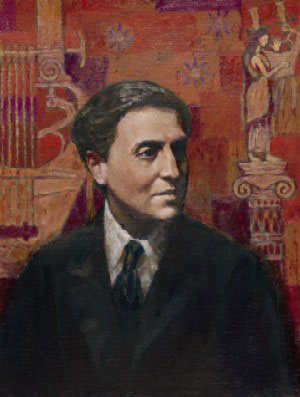by Daniel Hathaway
MISSING LULU:

THIS WEEKEND ON THE WEB (AND AIRWAVES):
On Saturday, the Berlin Philharmonic Brass Ensemble performs live ($), the MET opera streams Verdi’s Rigoletto, the Cincinnati Symphony replaces its 150th anniversary concert with a physically-distanced live stream, and WCLV rebroadcasts The Cleveland Orchestra and Chorus with Jakub Hrůša.
On Sunday, Florida Grand Opera debuts its Sunday Matinee series, pianist Nathan Carterette performs from Iowa City, a Detroit Symphony Watch Party features Leonard Slatkin & Robert Spano conducting Debussy & Stravinsky, WCLV broadcasts The Cleveland Orchestra’s performance of Strauss’s Alpine Symphony, Local 4 of the Musicians’ Union presents pianist Rock Wehrmann and bassist Aidan Plank, and the MET Opera ends the weekend with Verdi’s Nabucco. Details in our Concert Listings.
WEEKEND ALMANAC:
Only one birthday popped up in our weekend search: French composer Erik Satie was born on May 17, 1866, in Honfleur, Normandy. One of classical music’s foremost eccentrics, he contributed to the dadaist movement and influenced such modernists as John Cage.
Cleveland’s No Exit new music ensemble has presented a whole season (2015-2016) as well as wrapped individual concerts around Satie’s music and influence. In an interview with this publication, director Timothy Beyer said, “Like many composers that No Exit has highlighted in the past, Satie represents an artist who was very much guided by his own compass. While he may have been reacting to what was going on musically at the time, he is nevertheless a composer who really did his own thing. Unlike so much of what is thought of as ‘avant-garde,’ his work is infinitely accessible and so often filled with great whimsy.”
In addition to ubiquitous pieces like the Gymnopedie, Satie is notorious for such works as his 1893 Vexations, preserved in a manuscript discovered after his death. Presumably for piano, the one-page score may have been intended to be played 840 times in succession, based on a mysterious warning in the composer’s hand: “[To do this], it would be advisable to prepare oneself beforehand, and in the deepest silence, by serious immobilities.”
One enterprising pianist has taken on the challenge. Since you probably have a lot of time to kill these days, click here to spend 9.41 hours with Nicolas Horvath at the Conservatoire de Musique in Lagny-sur-Marne on the 26th June of 2011. The performer also offers a shorter time lapse video that will only cost you about ten minutes. Satie probably would have loved to watch Horvath toss off a page of the score at the end of each repetition.
INTERESTING READ:
In New York Magazine’s “Vulture,” architecture and classical music critic Justin Davidson contemplates what socially distanced live performance might look like. Read his May 14 article here.



